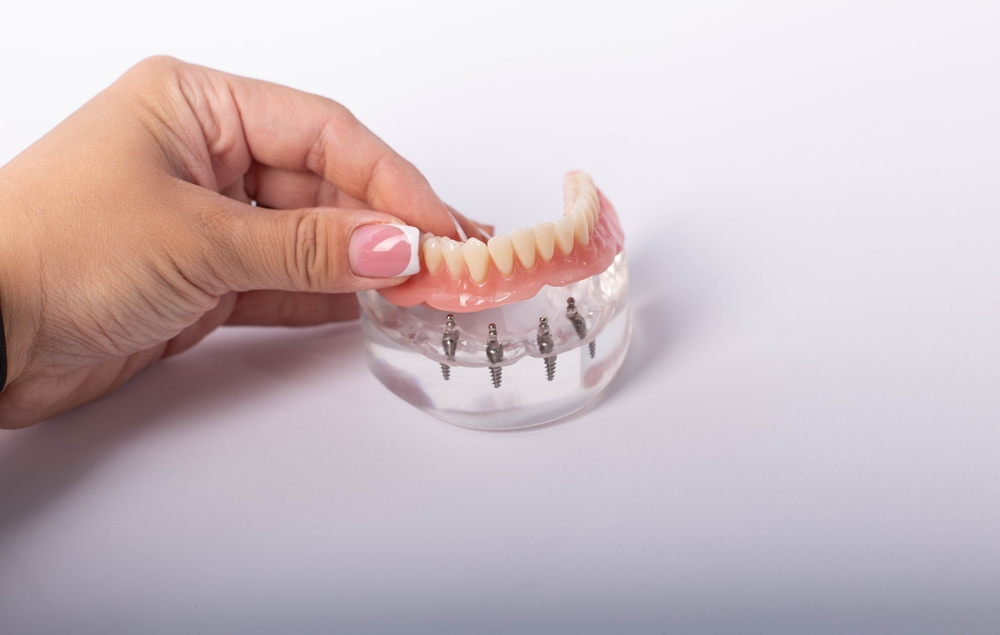Losing one or more of your natural teeth doesn’t have to permanently compromise your smile. Thanks to the remarkable innovation of dental implants, replacement teeth can look (and perform) exactly like your original teeth.
Beyond just filling the embarrassing gaps left by missing teeth, dental implants provide unmatched benefits in restoring full oral function. Because the replacement teeth are solidly secured to the implants rather than just resting on the gums, patients regain up to 70% more chewing force compared to conventional dentures.
Dental implants truly represent the gold standard for tooth replacement. This article shares everything you need to know about how dental implants work, what the procedure will be like, and how much dental implants typically cost.
Key Takeaways
- Dental implants are titanium fixtures placed beneath the gums, acting as durable anchors that can securely hold a tooth replacement for up to 20 years
- The procedure involves three key stages: initial preparations, the surgery itself, and the osseointegration period
- While dental implants are not always covered by dental insurance, payment plans and finance options can help make the procedure more accessible
What are Dental Implants?
Dental implants are small titanium posts that are surgically placed into the jawbone beneath the gums. Once integrated with the surrounding bone, these biocompatible implants act as durable anchors or artificial “tooth roots” to securely hold a replacement tooth in place.
This new tooth can be an implant-supported crown to replace a single missing tooth, or a set of implants can support an entire arch of lifelike replacements if the patient needs a comprehensive solution to replace missing teeth.
The Dental Implants Procedure
The journey to restoring your smile with dental implants covers three key stages: initial preparations, the implant surgery, and the recovery period.
Initial Preparations
An implant dentist will thoroughly examine your mouth during the initial appointment, taking 3D imaging scans and discussing your personal requirements. This treatment planning phase is crucial to figure out if you have the right bone density to support the implants.
Having sufficient bone density is vitally important, as the implants need this strong foundation to fuse with the jawbone properly. If bone loss has occurred due to an injury or other factors, a bone grafting procedure may be recommended first.
Once you have the right bone density, the next step is the implant surgery itself. This outpatient procedure is performed under anesthesia. A small incision will be made in the gum to precisely position the implant fixture, which is typically made of titanium. This fixture is placed into the jawbone so that it can support the implant later on.
The Implant Surgery
There are two main types of dental implants that can be used during the implant surgery: endosteal and subperiosteal. Endosteal implants are the most commonly used type and are surgically inserted directly into the jawbone after a channel is drilled. Over the next few months, the implant and bone are allowed to heal and fuse together through osseointegration.
Subperiosteal implants are an alternative option for patients who have minimal existing jawbone height. Rather than being implanted into the bone, the metal implant component is placed on top of the jaw, fitting snugly under the gum tissue.
The Recovery Period
The dental implant requires a post-surgery healing period that lasts several months. This period is crucial, locking the implant securely with the natural jaw bone via osseointegration. Once the recovery is complete, a follow-up appointment is scheduled. A connector piece called an implant abutment is attached during this follow-up, designed to securely anchor the dental restoration.

Implant-Supported Restorations
There are several options available when it comes to implant-supported dentures, depending on how many teeth need to be replaced.
For a single missing tooth, an implant can provide the ideal solution by serving as a sturdy base for an implant crown. This artificial tooth looks, feels, and functions just like a natural tooth, restoring your smile seamlessly.
If you’re missing several teeth in a row, implants can be strategically placed to support an implant-supported bridge. Rather than impacting adjacent healthy teeth as with a traditional bridge, this type of restoration spans the gap using the implants as anchors on each end. You’ll enjoy a stable, comfortable fit without excessive pressure or rubbing on the gums.
For patients missing most or all of their teeth, implant dentistry offers full-arch replacement options that provide unmatched stability and function compared to traditional removable dentures. As few as four implants can be used to secure an entire arch of top or bottom replacement teeth in the form of an implant-supported overdenture or full-bridge prosthetic.
The Benefits of Dental Implants
One of the primary benefits of dental implants is that they solve many of the challenges faced by people who wear conventional dentures. Rather than resting on the gums, prosthetic dentures are securely snapped onto the implants for a strong, intimate fit within the mouth. This anchor allows patients to bite down with up to 70% more force compared to traditional dentures.
Beyond restoring chewing capabilities, implant dentures also look and feel more natural without requiring messy adhesives or strips to hold them in place. You can eat your favorite foods, speak clearly, and smile broadly with unwavering confidence that the teeth won’t shift or come loose – a common source of embarrassment and anxiety for regular denture wearers.
And because the implants fuse directly with the jawbone, they help to preserve bone density and prevent the jaw deterioration that can occur with conventional dentures over time. With their enhanced fit, function, and natural appearance, implant-supported restorations truly redefine the denture experience and quality of life for the patient.

Dental Implant Care and Maintenance
Maintaining proper dental care is an important part of ensuring the long-term health of dental implants. While implants are designed to be extremely durable, lack of good oral hygiene can cause infections, bone loss, and potentially even implant failure down the road.
Caring for implants starts with being proactive at home between dental visits. An implant dentist can provide detailed instructions, but ultimately treating the implant restorations with the same level of care as natural teeth is key. This preventive maintenance helps control bacterial buildup and inflammation that could cause the implant’s integration with the jawbone to weaken over time.
How to Care for your Dental Implants
Here are some important tips for at-home oral hygiene with dental implants:
- Brush twice daily using a soft-bristle toothbrush
- Floss once a day to remove plaque from around implant crowns
- Use interdental brushes or other cleaning aids to access tight spaces
- Rinse with an antimicrobial mouthwash to kill bacteria and freshen breath
- Avoid smoking or other tobacco use that hinders healing
- Never bite down on extremely hard foods that could damage implant crowns
Beyond diligent home care, deep cleaning services are also made available by implant dentists. The dentist utilizes special tools to access areas that are difficult to clean at home, thoroughly removing built-up plaque, calculus, or debris around the implant posts to ensure their longevity.

How much do dental implants cost?
Restoring your smile with dental implants is an investment in both your oral health and quality of life, but it can come with considerable costs. On average, the cost for a single implant tooth replacement ranges from $3,000 to $6,000 — this covers the implant fixture itself, the abutment that connects it to the crown, and the custom ceramic crown restoration.
For patients requiring multiple implants, the costs of the dental procedure can quickly add up. A full arch of implant-supported replacement teeth can range from $30,000 to $50,000 or more. One major factor influencing overall implant costs is if any supplemental procedures are required first, such as tooth extractions or bone grafting.
Up to half of implant candidates experience some degree of jaw bone loss that needs to be rebuilt prior to implant surgery. Bone grafting procedures can tack on an additional $300 to $3,000+ depending on the extent of grafting needed.
Does dental insurance cover implants?
Most basic dental plans provide little to no coverage for the implant device itself, as it is categorized as a cosmetic or non-essential procedure. However, portions of the final implant crown, abutment component, or other restorative costs may be partially covered up to the policy’s annual limits. But full coverage for an implant tooth is very rare.
Despite the high upfront price tag, many patients find dental implants to be a worthy investment when considering the ongoing costs and hassles associated with traditional dentures. Implants can easily last 20 years or more with proper care, offering exceptional function, comfort and aesthetic benefits that removable prosthetics cannot match. Payment plans and financing options help make this best-in-class tooth replacement solution much more accessible.

Choosing the Right Implant Dentist
Picking the right oral surgeon is possibly the most important decision you’ll make. An experienced, highly skilled implant specialist can mean the difference between achieving a successful, comfortable, long-lasting result or running into potential complications down the road.
Dental implant surgery requires an extensive level of advanced training and expertise — far beyond that of a general dentist. Even a small degree of error in implant placement, angulation, or technique can interfere with the implant’s ability to properly integrate with your jawbone. This can lead to issues like infection, bone loss, implant failure, and the need for expensive revision procedures.
My Emergency Dental has a fantastic track record when it comes to patient satisfaction. We surveyed 677 of our patients and asked them if they would refer a friend or family member, and every single one of them said yes.
“I always have a good experience with My Emergency Dental. But this time was the smoothest and easiest I’ve ever had. Great work!” — Brian W.
“The service was awesome. I would definitely recommend this facility.” — Kwame K.
While leading implant dentists tend to carry higher fees, the benefits of having this transformative procedure performed properly the first time by an expert far outweigh the costs and complications of having to repair or redo implant work.
A Final Word
Dental implants are securely anchored into the jawbone, providing unparalleled stability that allows the patient to eat, speak, and smile with confidence — just like a normal set of teeth. On top of restoring up to 70% more biting force compared to traditional dentures, implant restorations are precisely customized to match the proportions of the natural teeth.
With proper care and maintenance, dental implants can last 20 years or more. Don’t settle for anything less than your best smile — if you’re considering dental implants, the first step is to consult with an experienced implant dentist. Reach out to My Emergency Dental today and we can guide you through the process every step of the way.




